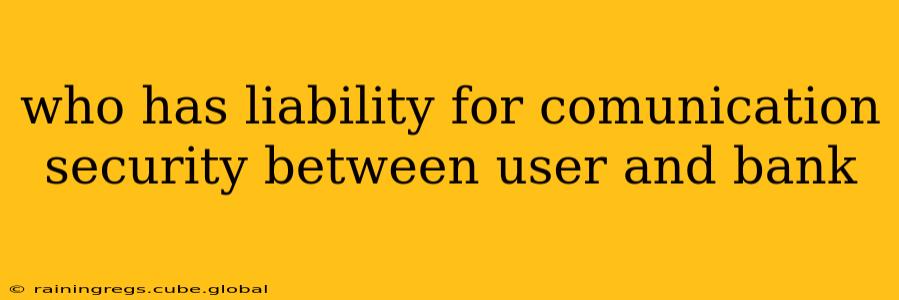Who Has Liability for Communication Security Between User and Bank?
The liability for communication security between a user and their bank is a complex issue, shared between the user and the bank, but with the ultimate responsibility often falling on the financial institution. While both parties have obligations, the specifics depend on several factors, including applicable laws, regulations, and the terms of service agreed upon by the user.
The Bank's Liability:
Banks have a legal and ethical responsibility to protect their customers' data and financial transactions. This responsibility stems from:
- Regulatory Compliance: Banks are subject to stringent regulations (like the Gramm-Leach-Bliley Act in the US or GDPR in Europe) mandating the implementation of robust security measures to safeguard customer information and prevent fraud. Failure to meet these regulations can result in significant penalties.
- Contractual Obligations: The terms and conditions that users agree to when opening an account typically include provisions regarding data security and the bank's commitment to protecting customer information. A breach of these terms could lead to legal action by the user.
- Duty of Care: Banks have a general duty of care to their customers. This means they must take reasonable steps to protect their customers from foreseeable risks, including those related to communication security.
The User's Responsibility:
While banks bear the primary burden, users also have responsibilities in maintaining secure communication:
- Password Security: Users should choose strong, unique passwords and avoid reusing passwords across multiple accounts.
- Phishing Awareness: Users must be vigilant against phishing attempts, which aim to trick them into revealing sensitive information.
- Software Updates: Keeping their operating systems, browsers, and antivirus software up-to-date is crucial to protect against vulnerabilities.
- Suspicious Activity Reporting: Users should promptly report any suspicious activity or unauthorized transactions to their bank.
What Happens if a Security Breach Occurs?
In the event of a security breach, determining liability involves a detailed investigation to determine the cause and extent of the breach. Several factors are considered:
- The Source of the Breach: Was it due to a vulnerability in the bank's systems, a user's negligence, or a third-party attack?
- The Bank's Security Measures: Did the bank implement reasonable security measures to protect against the type of breach that occurred?
- The User's Actions: Did the user contribute to the breach through negligence or failure to follow security best practices?
Often, courts will apportion liability based on the relative contributions of each party. For example, if a breach was caused by a user clicking a phishing link, the user might bear a portion of the responsibility. However, if the breach resulted from a significant flaw in the bank's security systems, the bank would likely bear the majority of the liability.
What if I suspect my bank hasn't taken adequate security measures?
If you suspect your bank hasn't taken adequate security measures, you should:
- Review your bank's security policy and terms of service.
- Contact your bank's customer service department to express your concerns.
- Consider reporting your concerns to the appropriate regulatory authority. (e.g., the Consumer Financial Protection Bureau (CFPB) in the US).
- Consult with a lawyer specializing in financial law.
Who is responsible if a third party hacks the communication channel?
Liability in cases of third-party hacks depends heavily on the specific circumstances and whether the bank implemented reasonable security measures to protect against such attacks. Generally, the bank is expected to have implemented industry-standard security protocols to prevent such breaches. Failure to do so could expose them to liability.
Ultimately, the question of liability for communication security between a user and a bank is complex and fact-specific. While banks have a greater responsibility, users also play a significant role in maintaining their own security. A collaborative approach, with both parties taking reasonable steps to protect against breaches, is crucial.
